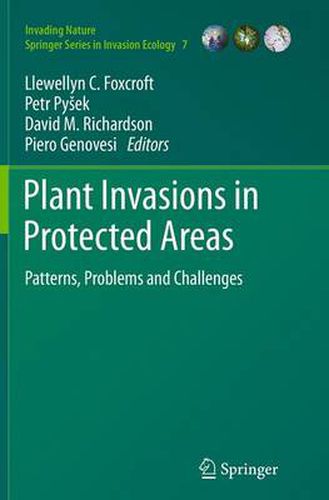Readings Newsletter
Become a Readings Member to make your shopping experience even easier.
Sign in or sign up for free!
You’re not far away from qualifying for FREE standard shipping within Australia
You’ve qualified for FREE standard shipping within Australia
The cart is loading…






This title is printed to order. This book may have been self-published. If so, we cannot guarantee the quality of the content. In the main most books will have gone through the editing process however some may not. We therefore suggest that you be aware of this before ordering this book. If in doubt check either the author or publisher’s details as we are unable to accept any returns unless they are faulty. Please contact us if you have any questions.
This book is the first comprehensive global review of all aspects of alien plant invasions in protected areas. It provides insights into advances in invasion ecology emanating from work in protected areas, and the link to locally relevant management support for protected areas. The book provides in-depth case studies, illuminating interesting and insightful knowledge that can be shared across the global protected area network. The book includes the collective understanding of 80 ecologists and managers to extract as much information as possible that will support the long-term management of protected areas, and the biodiversity and associated ecosystem services they maintain.
This outstanding volume draws together pretty much all that can be said on this topic, ranging from the science, through policy, to practical action . Dr. Simon N. Stuart, IUCN Species Survival Commission, UK.
This important and timely volume addresses two of the most serious problems affecting biodiversity conservation today: assessing the extent to which protected areas are impacted by biological invasions and the complex problems of managing these impacts. Written by leading specialists, it provides a comprehensive overview of the issues and gives detailed examples drawn from protected areas across the world . Professor Vernon H. Heywood, School of Biological Sciences, University of Reading, UK
$9.00 standard shipping within Australia
FREE standard shipping within Australia for orders over $100.00
Express & International shipping calculated at checkout
This title is printed to order. This book may have been self-published. If so, we cannot guarantee the quality of the content. In the main most books will have gone through the editing process however some may not. We therefore suggest that you be aware of this before ordering this book. If in doubt check either the author or publisher’s details as we are unable to accept any returns unless they are faulty. Please contact us if you have any questions.
This book is the first comprehensive global review of all aspects of alien plant invasions in protected areas. It provides insights into advances in invasion ecology emanating from work in protected areas, and the link to locally relevant management support for protected areas. The book provides in-depth case studies, illuminating interesting and insightful knowledge that can be shared across the global protected area network. The book includes the collective understanding of 80 ecologists and managers to extract as much information as possible that will support the long-term management of protected areas, and the biodiversity and associated ecosystem services they maintain.
This outstanding volume draws together pretty much all that can be said on this topic, ranging from the science, through policy, to practical action . Dr. Simon N. Stuart, IUCN Species Survival Commission, UK.
This important and timely volume addresses two of the most serious problems affecting biodiversity conservation today: assessing the extent to which protected areas are impacted by biological invasions and the complex problems of managing these impacts. Written by leading specialists, it provides a comprehensive overview of the issues and gives detailed examples drawn from protected areas across the world . Professor Vernon H. Heywood, School of Biological Sciences, University of Reading, UK